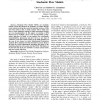365 search results - page 19 / 73 » Semi-automatic derivation of timing models for WCET analysis |
109
click to vote
RE
2010
Springer
14 years 6 months ago
2010
Springer
Abstract Requirements Engineering (RE) research often ignores, or presumes a uniform nature of the context in which the system operates. This assumption is no longer valid in emerg...
118
click to vote
CDC
2009
IEEE
14 years 9 months ago
2009
IEEE
Stochastic Flow Models (SFMs) are stochastic ystems that abstract the dynamics of complex discrete event systems involving the control of sharable resources. SFMs have been used to...
NCA
2002
IEEE
14 years 11 months ago
2002
IEEE
One of the key problems in forming a smooth model from input-output data is the determination of which input variables are relevant in predicting a given output. In this paper we ...
IPPS
2005
IEEE
15 years 5 months ago
2005
IEEE
— Schedule synthesis based on reachability analysis of timed automata has received attention in the last few years. The main strength of this approach is that the expressiveness ...
QEST
2008
IEEE
15 years 6 months ago
2008
IEEE
The UML profile for Modeling and Analysis of Real Time and Embedded systems (MARTE) provides a powerful, standardised framework for the specification of non-functional propertie...

